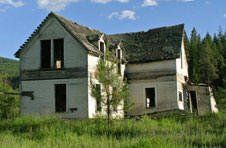Learn the History of Blanchard, Idaho
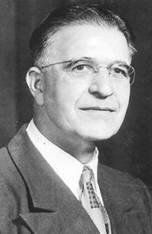
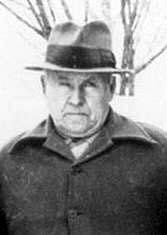
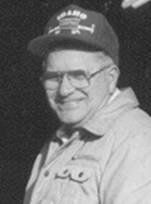
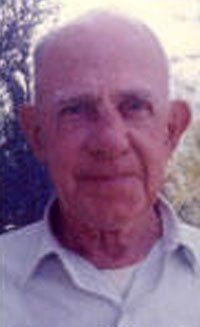
POIRIER PIONEERS
Rathdrum, Blanchard and Albeni Falls
By Fielden L. Poirier, Senior (written in approximately 1977)
Feilden Poirier Junior of Blanchard, IdahoIn 1883, the Northern Pacific Railway was built across the Territory of Idaho,causing a trading center to grow up at Rathdrum. This became headquarters for the stage lines and freight lines serving the Kellogg-Wallace mines to the south and later connecting with riverboats on the Pend Oreille River, to the north. One of the Indian-Trapper trails led from Rathdrum past Twin Lakes, Spirit Lake, into Spirit Valley and on to the falls that were later named Albeni Falls for my uncle Albeni Poirier. My father, Louis M. Poirier, age 18 and my uncle Albeni, age 20, were French Canadians who could hardly speak English when they followed the trail with packs on their backs in 1883. Reaching Spirit Valley they decided to camp and look around. They found large virgin yellow pine and fertile soil covering the level areas plus many lakes, pure springs and streams. My father chose a small valley about two miles south of the present town of Blanchard, built a cabin and squatted on his land until it was surveyed in 1892 and then filed claim under the Homestead Act. Then he purchased an adjoining quarter section of land from the Northern Pacific Railway for $2.50 an acre. In three generations this farm has grown to five sections and is now operated by my son … Fielden L. Poirier, Jr. (Sonny)
Feilden Poirier Junior of Blanchard, IdahoMy father, Louis, and his brother, Albeni had arrived in Rathdrum on the first Northern Pacific passenger train in 1883. His brother Joe previously arrived by way of the Mullen Road in 1879. Another brother, Hector, and a sister, Mederise came soon after. Thus,five of the thirteen children of the Poirier family migrated to the wild west from St. John the Baptist, Quebec, Canada. Louis and Albeni operated a cattle ranch in partnership until 188, when Albeni married Mary McGuire and moved to the land at Albeni falls. This included the falls, the island in the Pend Oreille River and acreage along the east bank. The Poirier brothers, with help of other pioneers, built the wagon road from Rathdrum to Albeni falls, along the route of the old Indian Trapper Trail. When the Great Northern Railroad came through from upper Montana and Idaho in 1893 the island was used as part of the bridge system to reach Newport and Spokane.
Mike and Tom Kelly started the first trading post near Albeni Falls in 1889, in a log cabin on the west bank of the river at what is now Old Town, Idaho. The Kelly’s called a meeting of settlers in 1890, to choose a name for a new post office. Someone said that the steamboats starting to operate from Albeni Falls would probably establish a new port at the site of the Kelly Store. So the name “Newport” was agreed upon. The post office was in Idaho at first but was moved over the line to Washington. The town of Blanchard was named for Joe Blanchard, my father’s brother-in-law, an early settler who moved away to Kootenai Lake in Canada. The town of Tweedie was named for Henry Tweedie, another settler.
R. C. Blackwell of the Panhandle Lumber Company, which operated sawmills at Spirit Lake, Idaho and at Ione, Washington, promoted the railroad, which came through Blanchard in 1908. This increased the prosperity of the settlers and brought many new people into the community. Soon all available homesteads on both sides of Spirit Valley were taken. The original one-room log schoolhouse was replaced by a larger one-room frame building, and school was extended up to nine months each year.
Louis M Poirier of Blanchard, Idaho then in 1912, my father Louis M. Poirier, J.H. Presnell, Frank Rusho and Elmer Boehm organized the Blanchard Trading Company, Ltd. and started operating a general merchandise store. As a boy, I was employed there as a clerk. Later, I bought the store and operated until 1954. Then I sold it to Claude Blanchard, grandson of the man man for whom the town had been named. I was assistant postmaster and then postmaster postmaster from 1912 to 1954. Before the coming of the railroad in 1908 I never knew a house in the valley to be locked. Homes were left open, and generally a supply of food was food was available for any traveler or neighbor who might pass that way.
This is in memory of a great pioneer, Louis M. Poirier, an honest and determined determined man with a vision, who was not afraid of work.
Editors note: We are thankful for each generation of Poiriers who have continued to be dedicated pioneers for the good of Blanchard and surrounding areas.
History of Blanchard
Charles Cook, Historian
History of Blanchard
